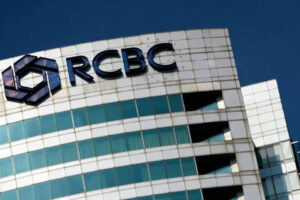RIZAL COMMERCIAL Banking Corp. (RCBC) saw its net profit decrease by 37.01% in the third quarter as its non-interest income was dragged down by foreign exchange losses.
RCBC’s attributable net income stood at P1.77 billion in the three months through September, down from P2.81 billion in the same period last year, its financial statement disclosed to the stock exchange on Thursday showed.
This brought its net earnings for the first nine months to P6.22 billion, 31.12% lower than P9.03 billion in the same period last year.
This translated to a return on average assets of 0.7% and a return on average equity of 5.2%, down from 1.1% and 9.5% at end-2023, respectively.
RCBC’s net interest income rose by 25.69% to P11.18 billion in the third quarter from P8.895 billion.
This came as its interest earnings went up by 17.53% to P20.33 billion from P17.298 billion mainly driven by higher interest income from loans, outpacing the 8.89% increase in interest expenses to P9.15 billion.
Net interest margin was at 3.8% at end-September, up from 3.4% at end-2023.
Meanwhile, the bank’s other operating income decreased by 56.39% year on year to P1.57 billion in the third quarter from P3.6 billion as it booked a foreign exchange loss amounting to P1.84 billion, a reversal of the P464-million gain seen in the same period last year. The absence of trust fee income this year after it spun off its trust unit into a stand-alone firm starting January 2024 also contributed to the decline.
These offset increases in its earnings from service fees and commissions and trading and securities gains.
On the other hand, RCBC’s operating expenses increased by 4.49% to P7.91 billion from P7.57 billion amid higher compensation, occupancy and miscellaneous costs.
As a result, its cost-to-income ratio stood at 61.7% at end-September, up from 59.2% at end-2023.
RCBC’s net loans expanded by 7.35% to P697.73 billion as of September from P649.93 billion at end-2023. Loans grew by 11% year on year, the bank said.
“The bank’s loan expansion was primarily driven by the consumer segment, with credit card and personal loans receivables growing by 58%. Data science and digital innovations have contributed to the growth in customer and loan volumes,” RCBC said.
“Additionally, the auto loan portfolio grew by 39% as RCBC leveraged new marketing and sales strategies to expand its market reach. While consumer loans now represent 39% of the bank’s total portfolio, the corporate and SME (small and medium enterprise) portfolios constitute the remaining 61%,” it added.
RCBC attributed the growth in its consumer loan portfolio to its ability to combine its core strengths with its innovative digital platforms.
“At RCBC, we are committed to fostering growth for Filipino consumers by leveraging digital solutions that make financial services more accessible and convenient,” RCBC President and Chief Executive Officer Eugene S. Acevedo said.
RCBC’s nonperforming loan ratio was at 2% as of September, up from 1.6% at end-2023.
On the funding side, deposits increased by 3.53% to P990.44 billion at end-September from P956.71 billion at end-2023.
This resulted in a loan-to-deposit ratio of 68.4%, up from 65.1%.
RCBC’s total resources stood at P1.28 trillion at end-September, 3.23% higher than P1.24 trillion at end-2023.
Total equity was at P158.099 billion.
Its common equity Tier 1 ratio was at 13.75% as of September, slightly lower than 14.7% at end-2023, while capital adequacy ratio was at 16.31%, also down from 17.4%.
The bank had 463 branches, 1,482 automated teller machines (ATM), and 7,013 ATMGo terminals nationwide as of Sept. 30.
RCBC’s shares dropped by P1.25 or 4.75% to close at P25.05 apiece on Thursday. — A.M.C. Sy

